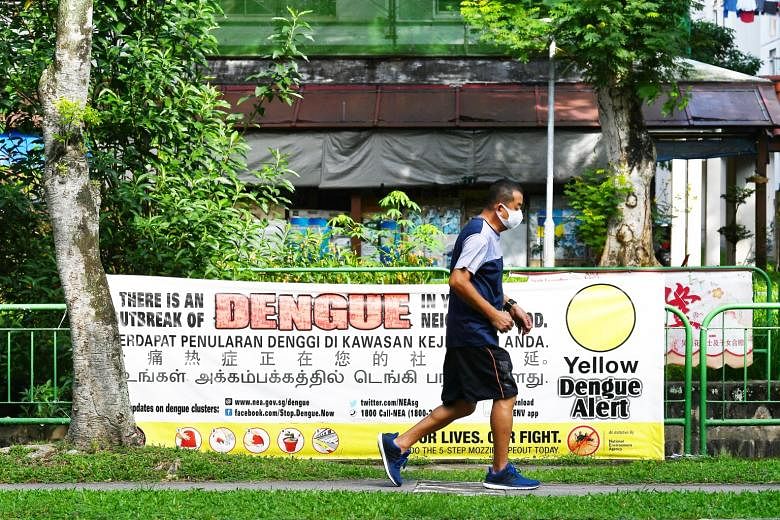Singapore may face the biggest dengue outbreak ever, warns the National Environment Agency (NEA), "unless collective community action is taken".
It issued a release saying the number of weekly cases is expected to exceed the historical high of 891. The 735 cases last week is the highest in more than five years.
Since Sunday, another 291 people have been infected. As of 3pm on Tuesday, there has been 9,261 infections - or far more than double the number last year for the same period.
The NEA said: "The number of dengue cases this year is expected to exceed the 15,998 cases reported in 2019, and may even surpass the 22,170 cases reported in 2013."
In the past two months, another five people have died from dengue, taking the total number of deaths this year to 12.
The Ministry of Health said the 12 people who died after getting the mosquito-borne disease were aged between 56 and 80 years old. Ten of them worked or resided in active dengue clusters. Last year, 20 people died of dengue.
There are now 176 active dengue clusters, the biggest at Woodleigh with 181 people infected.
The NEA said: "Weekly dengue case numbers are likely to continue to rise and more dengue clusters will form in the coming weeks to months."
It said several factors contribute to the huge increase in dengue infections. One is the change in the dominant dengue serotype to DenV-3, which was last dominant about 30 years ago. This means that few people have immunity against it. There are four dengue serotypes and people are immune against only the type they have previously been infected with. Second, the months of May to September are warmer, allowing mosquitoes to breed more easily. And third, with the circuit breaker to control the Covid-19 pandemic in Singapore, more people are staying home.
The NEA said: "With a shift in human concentration from offices to homes, more people staying at home during the day also means more blood meals for the female Aedes aegypti mosquitoes, especially in residential areas where the mosquito population is also high."
Professor Ooi Eng Eong, deputy director of the emerging infectious diseases programme at Duke-NUS Medical School, agreed that the circuit breaker could have added to the dengue outbreak. "Aedes mosquitoes are active in seeking blood meals during the daytime and more people spending time at home instead of at work... could have led to the increased rates of infection."
The NEA said there has been a fivefold increase in Aedes mosquito larvae detected in homes and common corridors in residential areas during the two-month circuit breaker period compared with the two months before that.
It has been trying to reduce the mosquito population by releasing sterile male mosquitoes at key hot spots across Singapore so that eggs from female mosquitoes they mate with would not hatch.
Doctors have also been giving out mosquito repellent to patients suspected to have dengue, to prevent them from being bitten and possibly passing the virus on to others. The plan is to distribute about 300,000 bottles of repellent at GP clinics and polyclinics.
The NEA urged residents, contractors and business owners to help fight dengue by preventing the breeding of mosquitoes.



